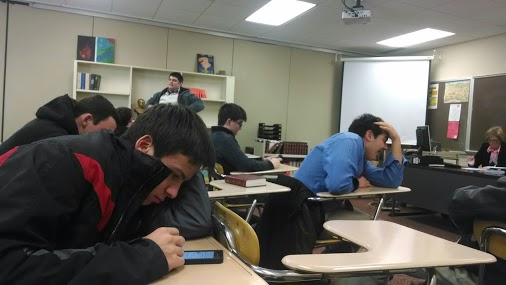by Sam Royer ’15
“The ‘decriminalization’ of cell phone use is upon us,” Principal Bradesca ’88 has declared. After what has seemed like a long year of prohibited cell-phone use, an update in the school policy is being set in place.
“Allowing students to bring their own technology to school for instructional purposes and believing one can simultaneously eliminate the ability of students to communicate electronically with each other and the outside community appears to be increasingly unrealistic thinking,” Bradesca said in a letter shared with the teachers and faculty.
The change, which will allow students to use phones at appropriate times and for appropriate reasons, comes mainly due to Bradesca’s understanding that most students have two devices on any time, mirroring the college experience.
“Students use phones to take pictures of whiteboards, experiments in-progress in labs, to record dialogue in language class, to create and play reflections with video/audio for various classes, as well as quick note-taking and calendaring,” Bradesca said.
Bradesca has suggested that many teachers successfully take a “Ready to Use” position, a technique in which the student’s phone is placed on the right hand corner of his desk, supposedly lessening the temptation to text under the desktop.
Bradesca also acknowledged that the student behavior of any kind can really be boiled down to two words: etiquette and responsibility. “There are times when it is inappropriate to use [phones], and there are times when their use is of no consequence. Specific to cell phones, the overwhelming majority of our faculty and staff allow students to use their phones on a regular basis, both in and out of class,” Bradesca said. “Therefore, a faculty or staff member shall determine when a student is using his device in an unacceptable manner.”
Now, the cell-phone use policy has been updated to read as follows:
The use of cell phones or other electronic devices in a disruptive or unauthorized manner is not permitted. Use of said devices in an unauthorized or inappropriate manner may result in a JUG or confiscation of the device. Serious offenses of this nature include, but are not limited to:
Use of school or personal electronic devices to perform unethical actions such as
cheating, unauthorized collaboration, or plagiarism (e.g., cell phone texting
answers or taking pictures of exams).
The use of a cell phone or any electronic device whilst walking
The use of a cell phone or any electronic device in a forbidden area, including the
chapel, restrooms, and locker rooms
Students may not use their cell phones to make phone calls unless they do so in
a school office location with an adult present.






